NRS276: Integrating Caritas Processes and Clinical Reasoning Cycle
VerifiedAdded on 2023/06/12
|6
|1424
|471
Essay
AI Summary
This essay examines the application of the clinical reasoning cycle and Caritas processes in a nursing context, focusing on a case study of a patient with metastatic cancer. It identifies key aspects of the clinical scenario, describes the Caritas processes, and discusses their relationship to the clinical reasoning cycle. The essay further explains how these processes can be used to achieve solutions for the patient's care needs, highlighting the importance of trust, communication, and holistic support in end-of-life care. The medication regimen and palliative care are discussed in relation to clinical reasoning and the Caritas process.
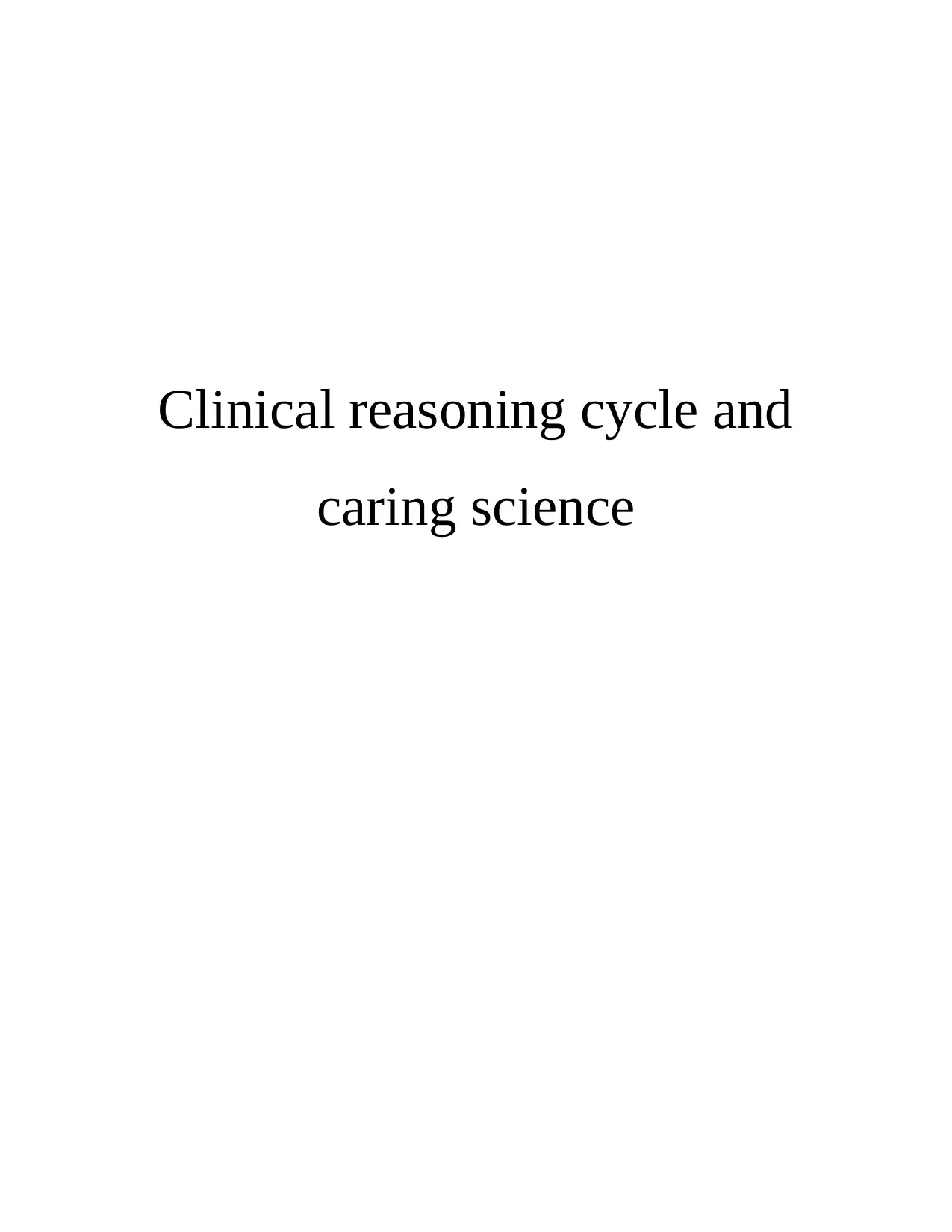
Clinical reasoning cycle and
caring science
caring science
Paraphrase This Document
Need a fresh take? Get an instant paraphrase of this document with our AI Paraphraser
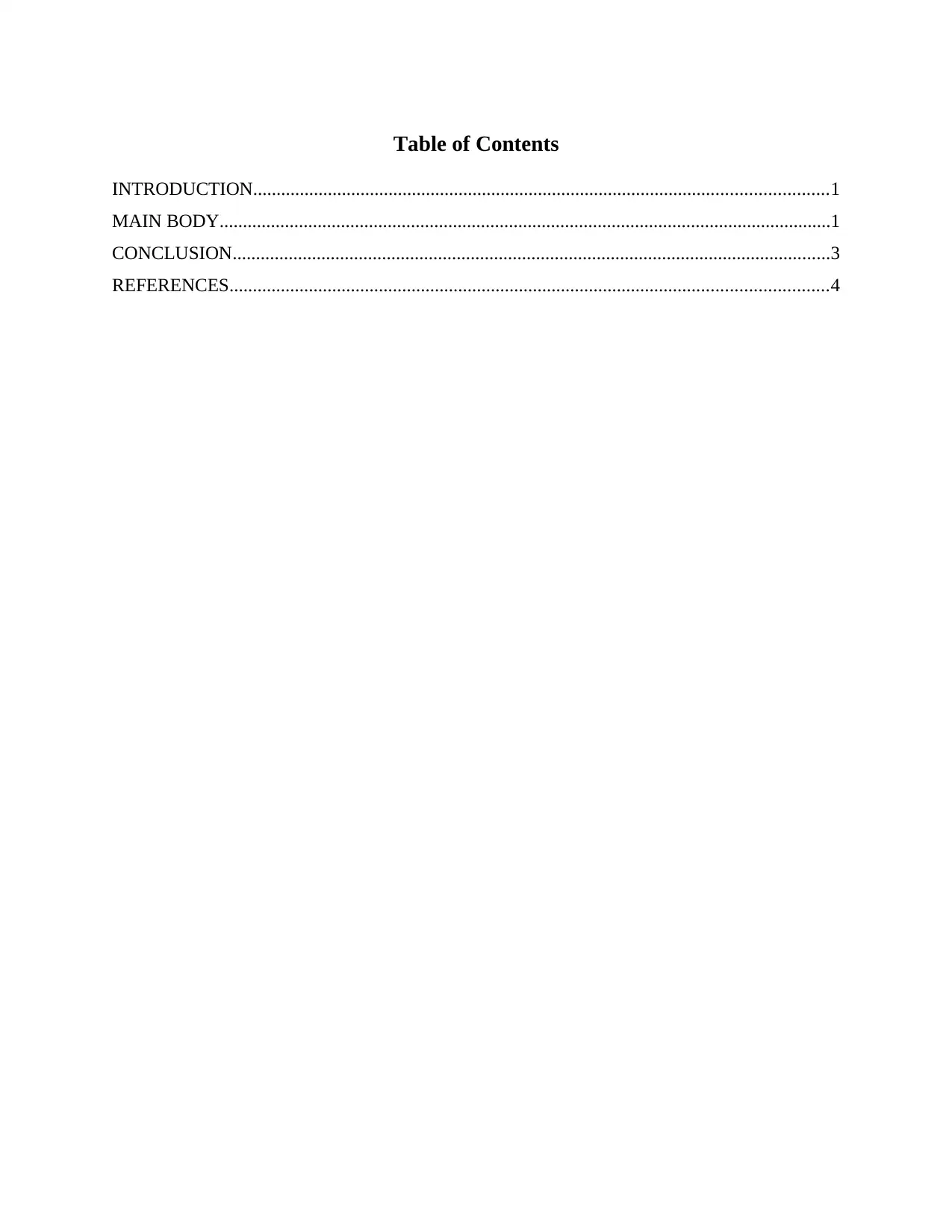
Table of Contents
INTRODUCTION...........................................................................................................................1
MAIN BODY...................................................................................................................................1
CONCLUSION................................................................................................................................3
REFERENCES................................................................................................................................4
INTRODUCTION...........................................................................................................................1
MAIN BODY...................................................................................................................................1
CONCLUSION................................................................................................................................3
REFERENCES................................................................................................................................4
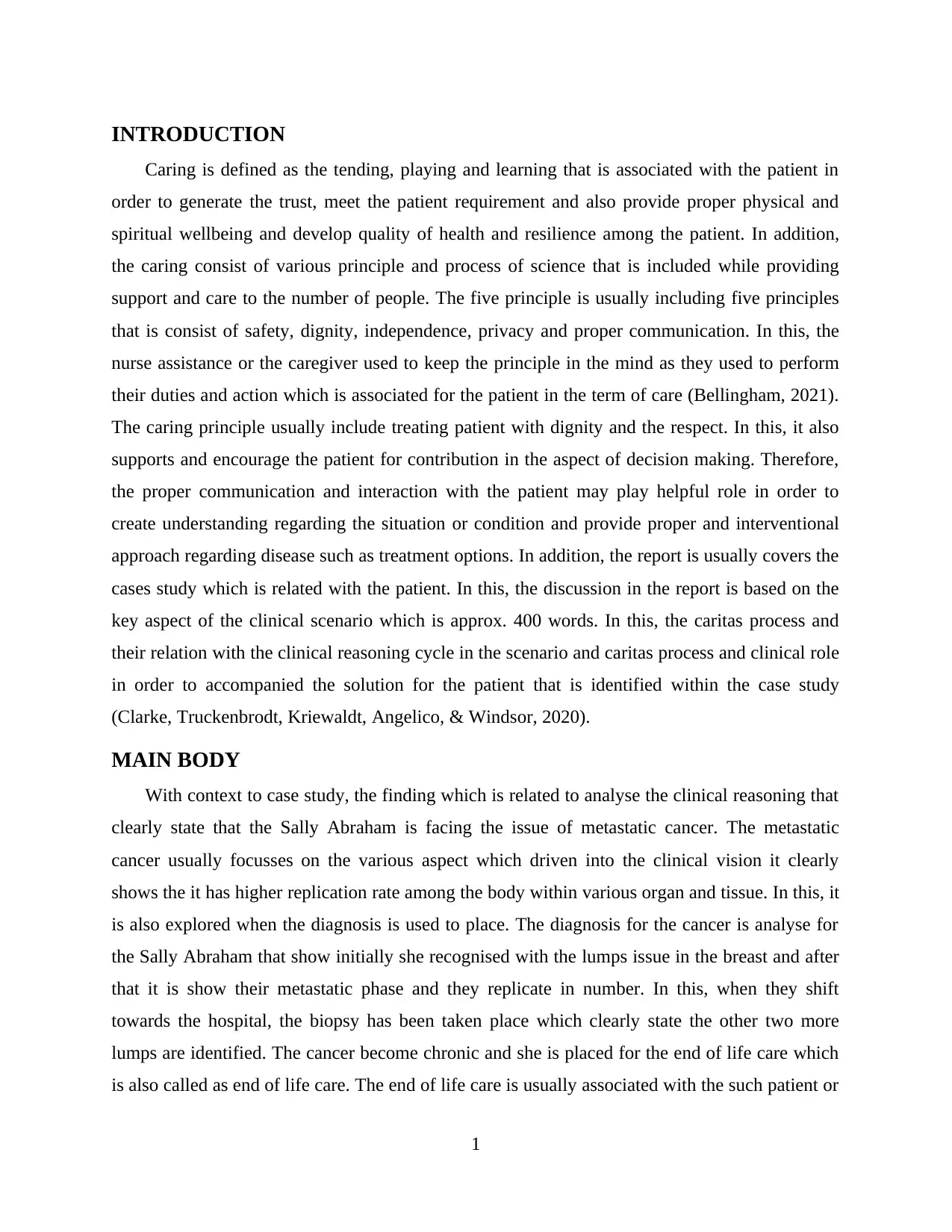
INTRODUCTION
Caring is defined as the tending, playing and learning that is associated with the patient in
order to generate the trust, meet the patient requirement and also provide proper physical and
spiritual wellbeing and develop quality of health and resilience among the patient. In addition,
the caring consist of various principle and process of science that is included while providing
support and care to the number of people. The five principle is usually including five principles
that is consist of safety, dignity, independence, privacy and proper communication. In this, the
nurse assistance or the caregiver used to keep the principle in the mind as they used to perform
their duties and action which is associated for the patient in the term of care (Bellingham, 2021).
The caring principle usually include treating patient with dignity and the respect. In this, it also
supports and encourage the patient for contribution in the aspect of decision making. Therefore,
the proper communication and interaction with the patient may play helpful role in order to
create understanding regarding the situation or condition and provide proper and interventional
approach regarding disease such as treatment options. In addition, the report is usually covers the
cases study which is related with the patient. In this, the discussion in the report is based on the
key aspect of the clinical scenario which is approx. 400 words. In this, the caritas process and
their relation with the clinical reasoning cycle in the scenario and caritas process and clinical role
in order to accompanied the solution for the patient that is identified within the case study
(Clarke, Truckenbrodt, Kriewaldt, Angelico, & Windsor, 2020).
MAIN BODY
With context to case study, the finding which is related to analyse the clinical reasoning that
clearly state that the Sally Abraham is facing the issue of metastatic cancer. The metastatic
cancer usually focusses on the various aspect which driven into the clinical vision it clearly
shows the it has higher replication rate among the body within various organ and tissue. In this, it
is also explored when the diagnosis is used to place. The diagnosis for the cancer is analyse for
the Sally Abraham that show initially she recognised with the lumps issue in the breast and after
that it is show their metastatic phase and they replicate in number. In this, when they shift
towards the hospital, the biopsy has been taken place which clearly state the other two more
lumps are identified. The cancer become chronic and she is placed for the end of life care which
is also called as end of life care. The end of life care is usually associated with the such patient or
1
Caring is defined as the tending, playing and learning that is associated with the patient in
order to generate the trust, meet the patient requirement and also provide proper physical and
spiritual wellbeing and develop quality of health and resilience among the patient. In addition,
the caring consist of various principle and process of science that is included while providing
support and care to the number of people. The five principle is usually including five principles
that is consist of safety, dignity, independence, privacy and proper communication. In this, the
nurse assistance or the caregiver used to keep the principle in the mind as they used to perform
their duties and action which is associated for the patient in the term of care (Bellingham, 2021).
The caring principle usually include treating patient with dignity and the respect. In this, it also
supports and encourage the patient for contribution in the aspect of decision making. Therefore,
the proper communication and interaction with the patient may play helpful role in order to
create understanding regarding the situation or condition and provide proper and interventional
approach regarding disease such as treatment options. In addition, the report is usually covers the
cases study which is related with the patient. In this, the discussion in the report is based on the
key aspect of the clinical scenario which is approx. 400 words. In this, the caritas process and
their relation with the clinical reasoning cycle in the scenario and caritas process and clinical role
in order to accompanied the solution for the patient that is identified within the case study
(Clarke, Truckenbrodt, Kriewaldt, Angelico, & Windsor, 2020).
MAIN BODY
With context to case study, the finding which is related to analyse the clinical reasoning that
clearly state that the Sally Abraham is facing the issue of metastatic cancer. The metastatic
cancer usually focusses on the various aspect which driven into the clinical vision it clearly
shows the it has higher replication rate among the body within various organ and tissue. In this, it
is also explored when the diagnosis is used to place. The diagnosis for the cancer is analyse for
the Sally Abraham that show initially she recognised with the lumps issue in the breast and after
that it is show their metastatic phase and they replicate in number. In this, when they shift
towards the hospital, the biopsy has been taken place which clearly state the other two more
lumps are identified. The cancer become chronic and she is placed for the end of life care which
is also called as end of life care. The end of life care is usually associated with the such patient or
1
⊘ This is a preview!⊘
Do you want full access?
Subscribe today to unlock all pages.

Trusted by 1+ million students worldwide
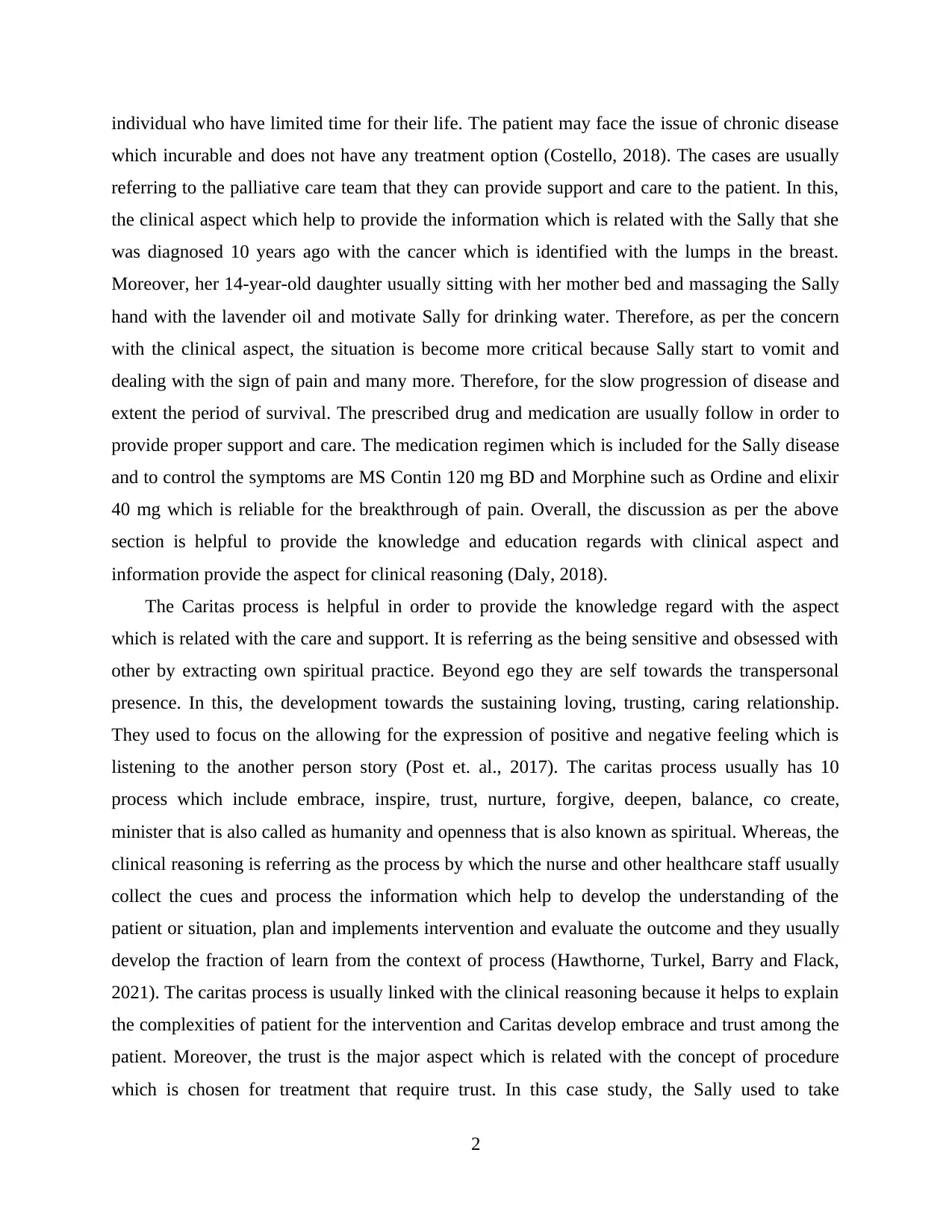
individual who have limited time for their life. The patient may face the issue of chronic disease
which incurable and does not have any treatment option (Costello, 2018). The cases are usually
referring to the palliative care team that they can provide support and care to the patient. In this,
the clinical aspect which help to provide the information which is related with the Sally that she
was diagnosed 10 years ago with the cancer which is identified with the lumps in the breast.
Moreover, her 14-year-old daughter usually sitting with her mother bed and massaging the Sally
hand with the lavender oil and motivate Sally for drinking water. Therefore, as per the concern
with the clinical aspect, the situation is become more critical because Sally start to vomit and
dealing with the sign of pain and many more. Therefore, for the slow progression of disease and
extent the period of survival. The prescribed drug and medication are usually follow in order to
provide proper support and care. The medication regimen which is included for the Sally disease
and to control the symptoms are MS Contin 120 mg BD and Morphine such as Ordine and elixir
40 mg which is reliable for the breakthrough of pain. Overall, the discussion as per the above
section is helpful to provide the knowledge and education regards with clinical aspect and
information provide the aspect for clinical reasoning (Daly, 2018).
The Caritas process is helpful in order to provide the knowledge regard with the aspect
which is related with the care and support. It is referring as the being sensitive and obsessed with
other by extracting own spiritual practice. Beyond ego they are self towards the transpersonal
presence. In this, the development towards the sustaining loving, trusting, caring relationship.
They used to focus on the allowing for the expression of positive and negative feeling which is
listening to the another person story (Post et. al., 2017). The caritas process usually has 10
process which include embrace, inspire, trust, nurture, forgive, deepen, balance, co create,
minister that is also called as humanity and openness that is also known as spiritual. Whereas, the
clinical reasoning is referring as the process by which the nurse and other healthcare staff usually
collect the cues and process the information which help to develop the understanding of the
patient or situation, plan and implements intervention and evaluate the outcome and they usually
develop the fraction of learn from the context of process (Hawthorne, Turkel, Barry and Flack,
2021). The caritas process is usually linked with the clinical reasoning because it helps to explain
the complexities of patient for the intervention and Caritas develop embrace and trust among the
patient. Moreover, the trust is the major aspect which is related with the concept of procedure
which is chosen for treatment that require trust. In this case study, the Sally used to take
2
which incurable and does not have any treatment option (Costello, 2018). The cases are usually
referring to the palliative care team that they can provide support and care to the patient. In this,
the clinical aspect which help to provide the information which is related with the Sally that she
was diagnosed 10 years ago with the cancer which is identified with the lumps in the breast.
Moreover, her 14-year-old daughter usually sitting with her mother bed and massaging the Sally
hand with the lavender oil and motivate Sally for drinking water. Therefore, as per the concern
with the clinical aspect, the situation is become more critical because Sally start to vomit and
dealing with the sign of pain and many more. Therefore, for the slow progression of disease and
extent the period of survival. The prescribed drug and medication are usually follow in order to
provide proper support and care. The medication regimen which is included for the Sally disease
and to control the symptoms are MS Contin 120 mg BD and Morphine such as Ordine and elixir
40 mg which is reliable for the breakthrough of pain. Overall, the discussion as per the above
section is helpful to provide the knowledge and education regards with clinical aspect and
information provide the aspect for clinical reasoning (Daly, 2018).
The Caritas process is helpful in order to provide the knowledge regard with the aspect
which is related with the care and support. It is referring as the being sensitive and obsessed with
other by extracting own spiritual practice. Beyond ego they are self towards the transpersonal
presence. In this, the development towards the sustaining loving, trusting, caring relationship.
They used to focus on the allowing for the expression of positive and negative feeling which is
listening to the another person story (Post et. al., 2017). The caritas process usually has 10
process which include embrace, inspire, trust, nurture, forgive, deepen, balance, co create,
minister that is also called as humanity and openness that is also known as spiritual. Whereas, the
clinical reasoning is referring as the process by which the nurse and other healthcare staff usually
collect the cues and process the information which help to develop the understanding of the
patient or situation, plan and implements intervention and evaluate the outcome and they usually
develop the fraction of learn from the context of process (Hawthorne, Turkel, Barry and Flack,
2021). The caritas process is usually linked with the clinical reasoning because it helps to explain
the complexities of patient for the intervention and Caritas develop embrace and trust among the
patient. Moreover, the trust is the major aspect which is related with the concept of procedure
which is chosen for treatment that require trust. In this case study, the Sally used to take
2
Paraphrase This Document
Need a fresh take? Get an instant paraphrase of this document with our AI Paraphraser
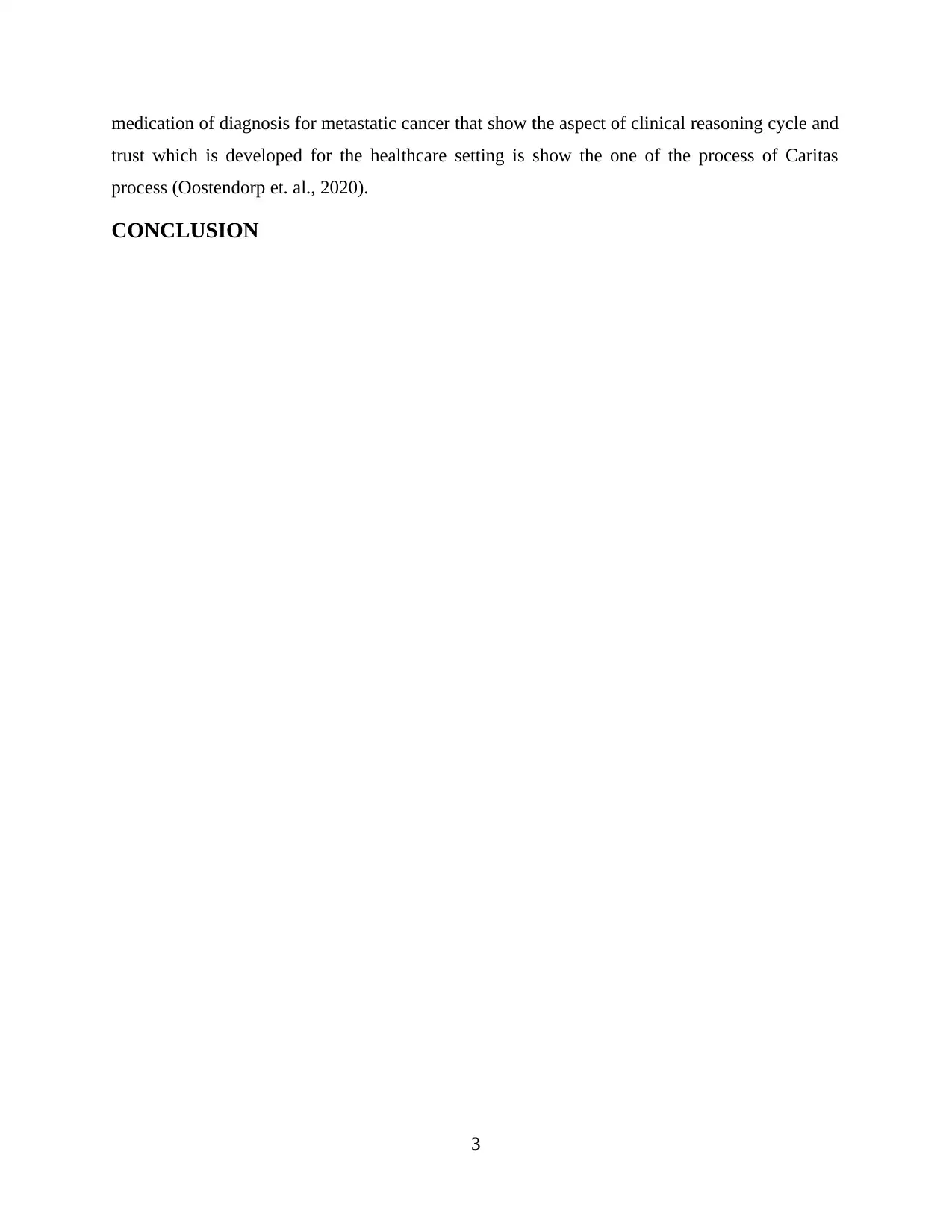
medication of diagnosis for metastatic cancer that show the aspect of clinical reasoning cycle and
trust which is developed for the healthcare setting is show the one of the process of Caritas
process (Oostendorp et. al., 2020).
CONCLUSION
3
trust which is developed for the healthcare setting is show the one of the process of Caritas
process (Oostendorp et. al., 2020).
CONCLUSION
3
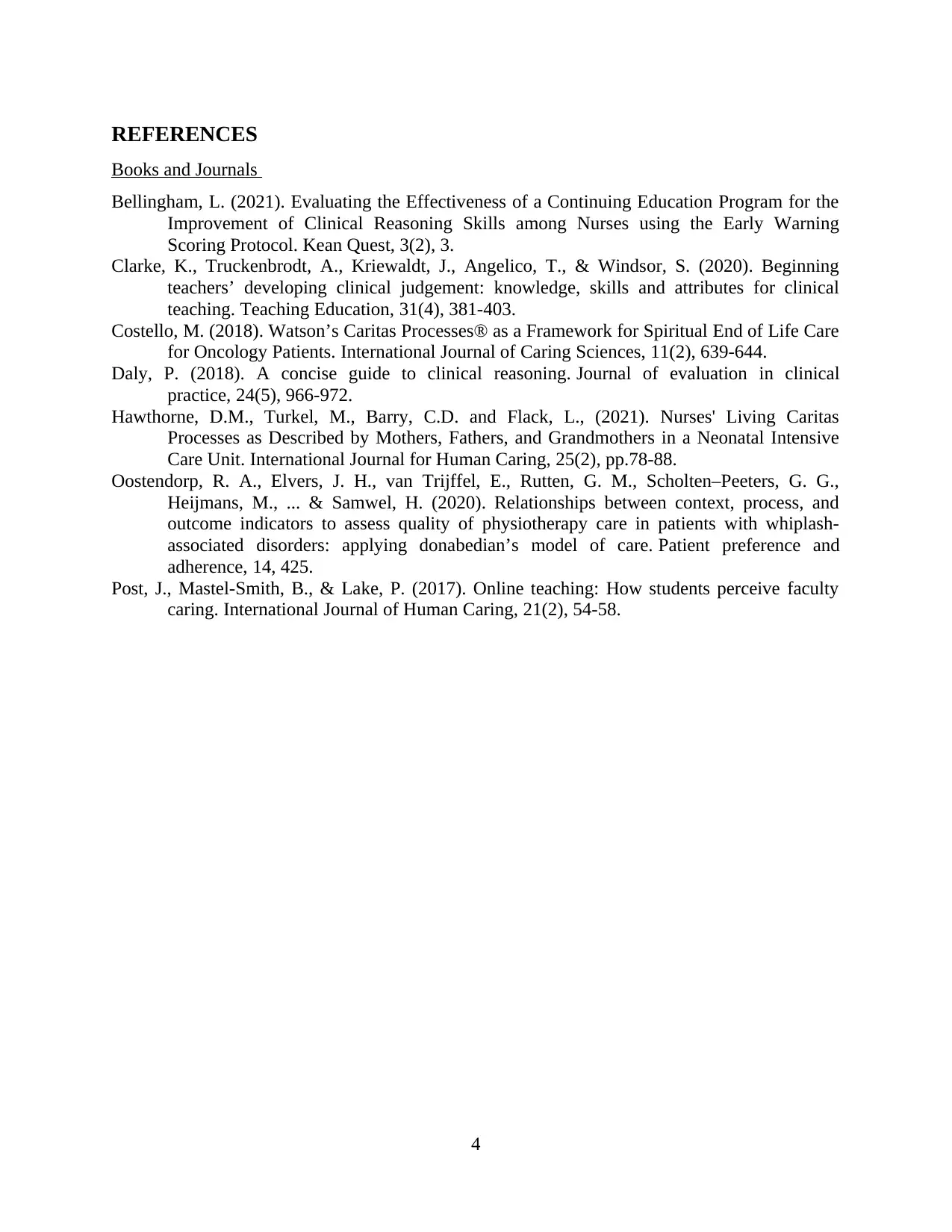
REFERENCES
Books and Journals
Bellingham, L. (2021). Evaluating the Effectiveness of a Continuing Education Program for the
Improvement of Clinical Reasoning Skills among Nurses using the Early Warning
Scoring Protocol. Kean Quest, 3(2), 3.
Clarke, K., Truckenbrodt, A., Kriewaldt, J., Angelico, T., & Windsor, S. (2020). Beginning
teachers’ developing clinical judgement: knowledge, skills and attributes for clinical
teaching. Teaching Education, 31(4), 381-403.
Costello, M. (2018). Watson’s Caritas Processes® as a Framework for Spiritual End of Life Care
for Oncology Patients. International Journal of Caring Sciences, 11(2), 639-644.
Daly, P. (2018). A concise guide to clinical reasoning. Journal of evaluation in clinical
practice, 24(5), 966-972.
Hawthorne, D.M., Turkel, M., Barry, C.D. and Flack, L., (2021). Nurses' Living Caritas
Processes as Described by Mothers, Fathers, and Grandmothers in a Neonatal Intensive
Care Unit. International Journal for Human Caring, 25(2), pp.78-88.
Oostendorp, R. A., Elvers, J. H., van Trijffel, E., Rutten, G. M., Scholten–Peeters, G. G.,
Heijmans, M., ... & Samwel, H. (2020). Relationships between context, process, and
outcome indicators to assess quality of physiotherapy care in patients with whiplash-
associated disorders: applying donabedian’s model of care. Patient preference and
adherence, 14, 425.
Post, J., Mastel-Smith, B., & Lake, P. (2017). Online teaching: How students perceive faculty
caring. International Journal of Human Caring, 21(2), 54-58.
4
Books and Journals
Bellingham, L. (2021). Evaluating the Effectiveness of a Continuing Education Program for the
Improvement of Clinical Reasoning Skills among Nurses using the Early Warning
Scoring Protocol. Kean Quest, 3(2), 3.
Clarke, K., Truckenbrodt, A., Kriewaldt, J., Angelico, T., & Windsor, S. (2020). Beginning
teachers’ developing clinical judgement: knowledge, skills and attributes for clinical
teaching. Teaching Education, 31(4), 381-403.
Costello, M. (2018). Watson’s Caritas Processes® as a Framework for Spiritual End of Life Care
for Oncology Patients. International Journal of Caring Sciences, 11(2), 639-644.
Daly, P. (2018). A concise guide to clinical reasoning. Journal of evaluation in clinical
practice, 24(5), 966-972.
Hawthorne, D.M., Turkel, M., Barry, C.D. and Flack, L., (2021). Nurses' Living Caritas
Processes as Described by Mothers, Fathers, and Grandmothers in a Neonatal Intensive
Care Unit. International Journal for Human Caring, 25(2), pp.78-88.
Oostendorp, R. A., Elvers, J. H., van Trijffel, E., Rutten, G. M., Scholten–Peeters, G. G.,
Heijmans, M., ... & Samwel, H. (2020). Relationships between context, process, and
outcome indicators to assess quality of physiotherapy care in patients with whiplash-
associated disorders: applying donabedian’s model of care. Patient preference and
adherence, 14, 425.
Post, J., Mastel-Smith, B., & Lake, P. (2017). Online teaching: How students perceive faculty
caring. International Journal of Human Caring, 21(2), 54-58.
4
⊘ This is a preview!⊘
Do you want full access?
Subscribe today to unlock all pages.

Trusted by 1+ million students worldwide
1 out of 6
Related Documents
Your All-in-One AI-Powered Toolkit for Academic Success.
+13062052269
info@desklib.com
Available 24*7 on WhatsApp / Email
![[object Object]](/_next/static/media/star-bottom.7253800d.svg)
Unlock your academic potential
Copyright © 2020–2026 A2Z Services. All Rights Reserved. Developed and managed by ZUCOL.



